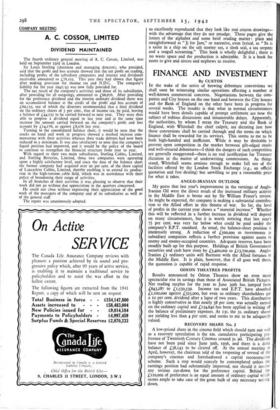FINANCE AND INVESTMENT
By CUSTOS
IN the wake of the series of brewing debenture conversions we shall soon be witnessing similar operations affecting a number of well-known commercial concerns. Negotiations between the com- panies and City houses on the one hand and between the City houses and the Bank of England on the other have been in progress for several weeks. The trouble is that what in normal circumstances would have been details capable of prompt settlement are now the subject of tedious discussions and innumerable delays. Apparently, the authorities, by whom I mean the Treasury and the Bank of England, with Whitehall the chief culprit, are dictating just how these conversions shall be carried through and the terms on which finance shall be rewarded for its services. This seems to me to be both high-handed and inefficient. While it may be desirable to prevent open competition in the market between gilt-edged stocks and well-secured debentures—I think the dangers of such competition are generally exaggerated—there is no real justification for Treasury dictation in the matter of underwriting commissions. As things stand, Whitehall seems anxious enough to make full use of the facilities offered by the London Stock Exchange (e.g., an official quotation and free dealing) but unwilling to pay a reasonable price for what it takes.
ANGLO-IRANIAN OUTLOOK My guess that last year's improvement in the earnings of Anglo- Iranian Oil were the direct result of the increased military activity in the Middle East is borne out by Sir William Fraser's review. As might be expected, the company is making a substantial contribu- tion to the Allied effort in this theatre of war. So far, the level of profits in the current year shows a " material increase." Whether this will be reflected in a further increase in dividend will depend on many circumstances, but it is worth noticing that last year's 7f per cent. was very far below what could be paid under the company's E.P.T. standard. As usual, the balance-sheet position is immensely strong. A reduction of £soo,000 in investments in subsidiary companies reflects a further provision against assets in enemy and enemy-occupied countries. Adequate reserves have been steadily built up for this purpose. Holdings of British Government securities and cash have risen by L5,40o,000 to L13,700,000. Anglo- Iranian Li ordinary units will fluctuate with the Allied fortunes in the Middle East. It is plain, however, that if all goes well there, the quotation is capable of rapid response.
ODEON THEATRES PROFITS
Results announced by Odeon Theatres show an even more spectacular rise in savings than those of Associated British Pictures. Net trading surplus for the year to June 3oth has jumped from £643,287 to £1,530,539. Income tax and E.P.T. have absorbed £1,100,000 against L325,000, but even so ordinary shareholders get a to per cent. dividend after a lapse of two years. This distribution is highly conservative in that nearly 38 per cent. was actually earned on the ordinary capital and £134,640 has been applied in writing off the balance of preliminary expenses. At 13s. the 5s. ordinary shares are yielding less than 4 per cent. and seems to me to be adequately valued.
RECOVERY SHARE No. 2
A low-priced share in the cinema field which should turn out well as a recovery speculation is the los. cumulative participating pre- ference of Twentieth Century Cinemas around 3s. 9d. The dividends have not been paid since June 30th, 1936, and there is a debit balance of £38,143 to be cleared off. At the annual meeting 111 April, however, the chairman told of the reopening of several of the company's cinemas and foreshadowed a capital reconstruction scheme. Such a step would scarcely be contemplated unless the earnings position had substantially improved, nor should it involve any serious cut-down for the preference capital. Behind the £120,000 of preference is an equal amount of ordinary capital which seems ample to take care of the great bulk of any necessary writing down.


























 Previous page
Previous page